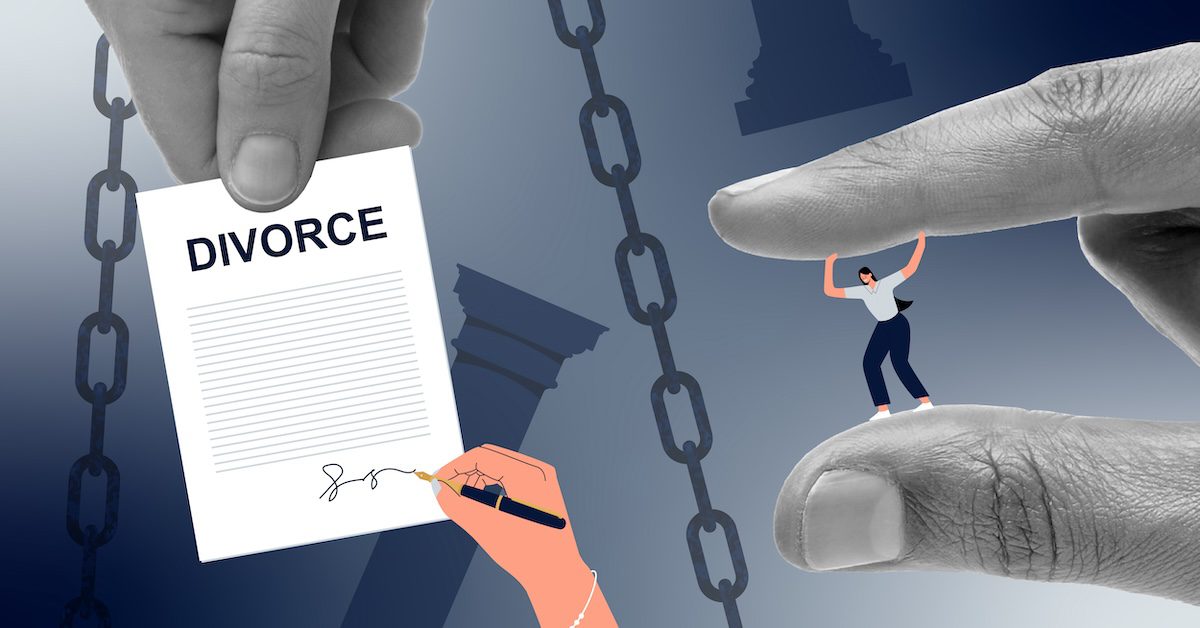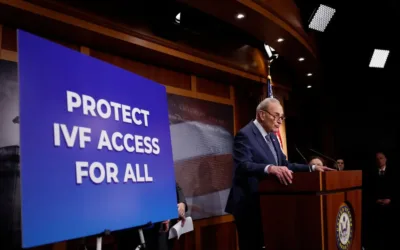
Graphic by Desiree Tapia
No-fault divorce laws have contributed to lower national rates of intimate partner violence, particularly against women. Some conservative leaders want to reinstate barriers to divorce by requiring “proof” of abuse or infidelity.
In all 50 states, Americans have the legal right to end their marriages without having to prove wrongdoing by a spouse, like physical abuse or infidelity. But if some conservative lawmakers have their way, these so-called “no-fault” divorce laws could become a thing of the past.
The first no-fault divorce law passed in 1969 under the approval of former president Ronald Reagan, who was governor of California at the time. In the following decades, no-fault divorce gradually became the law of the land across the nation, with New York becoming the final state to legalize it in 2010.
Supporters of no-fault divorce point to its protective power, particularly for women who find themselves in domestic violence situations. The passage of these laws has been correlated with lower rates of suicide in women, a 10% drop in the rates of women killed by their partners, and a 30% lower rate of intimate partner violence for men and women alike. That’s per a 2004 study from two economists who examined the impact of divorce laws on “family distress.”
Prior to these laws, many partners—primarily women—found themselves “trapped” in abusive marriages. Domestic violence against intimate partners or children can be challenging to prove in court. Even if a woman was granted a divorce, she’d be barred from remarrying or from receiving any assets in the split if proof of mistreatment by her spouse was deemed insufficient.
Pushback on no-fault divorce has reached legislative level
But some conservative Christian lawmakers and commentators, a large number of them men, are now pushing to do away with no-fault divorce. Opponents of no-fault divorce cite “unfair” treatment of husbands and higher rates of divorce, which they see as a moral societal failing.
Conservative media commentator Steven Crowder, who made headlines in 2023 when footage leaked of him verbally abusing his pregnant then-wife, has notably taken up the cause.
“No, this was not my choice,” an emotionally charged Crowder told podcast listeners after his wife filed for a split. “My then-wife decided that she didn’t want to be married anymore—and in the state of Texas, that is completely permitted.”
The push to eliminate no-fault divorce isn’t just chatter among conservative media hosts. Earlier this year, Republican Senator Dusty Deevers of Oklahoma filed a state senate bill that would eliminate the practice and force Oklahomans seeking divorce to prove their case with “clear and convincing evidence” of wrongdoing by a spouse.
And support for an end to the practice has come from more recognizable conservative leaders, including Ben Carson, who served as the US Secretary of Housing and Urban Development under former president Donald Trump. In his book, “The Perilous Fight: Overcoming Our Culture’s War on the American Family,” released earlier this year, Carson directly targeted the practice of no-fault divorce.
“For the sake of families, we should enact legislation to remove or radically reduce incidences of no-fault divorce,” wrote Carson, who some have speculated could serve as Trump’s running mate in the 2024 presidential race.
The practice has also been criticized by Republican lawmakers from Texas, Nebraska, and Louisiana, who have considered adding a rebuke of no-fault divorce to their party platforms.
Attacks on no-fault divorce join other threats to women’s autonomy
Conservative Christians’ attack on no-fault divorce comes amid a time of turmoil for women’s and reproductive rights in the US, spurred largely by the Supreme Court’s Dobbs decision in 2022 that overturned Roe v. Wade and eliminated the federal right to an abortion.
In the wake of Dobbs, ultra-conservative groups—including the far-right Heritage Foundation, which penned Project 2025, a policy blueprint for a second Trump term—and Republican leaders have continually targeted causes like in-vitro fertilization (IVF), birth control, state-level abortion rights, and other protections for women’s health care.
Supporters of no-fault divorce say attempts to strike down the laws are just another move in a long string of attacks on the rights and autonomy of women. In an op-ed published by The Atlantic last year, attorney and legal analyst Kimberly Wehle called conservative attempts to do away with no-fault divorce “alarming.”
“There is no express ‘right’ to marriage in the Constitution,” she wrote. “Although troubling vestiges of legal coverture still linger in American law, women these days are not considered legal ‘property’ to which a man’s constitutional due-process rights could conceivably attach.”
And despite concerns from conservative leaders about the impact of no-fault divorce laws on marriage preservation in the US, data from Bowling Green State University shows that the nation’s overall divorce rate has trended downward since 2008, with just a slight uptick from 2021 to 2022. In 2020 and 2021, the US divorce rate sat at a 40-year low for two consecutive years, with only 14 divorces for every 1,000 married women.

JD Vance admits to spreading racist lie about immigrants
Donald Trump and JD Vance have both spread lies that Haitian migrants in Springfield, Ohio are eating pets, leading to bomb and death threats in the...

Inside Project 2025’s Secret Training Videos
One centerpiece of that program is dozens of never-before-published videos created for Project 2025’s Presidential Administration Academy. The vast...

Despite ‘moderation’ claims, Wisconsin Republicans are still obsessed with attacking the LGBTQ community
From Sen. Ron Johnson’s GOP convention speech to legislative candidates, Republicans haven’t paused in their demeaning attacks on people who don’t...

Who is J.D. Vance? Here’s what to know about Trump’s VP pick.
Vance has compared abortion to murder and slavery, has criticized divorce, and has suggested people in “violent” marriages should try to work things...





